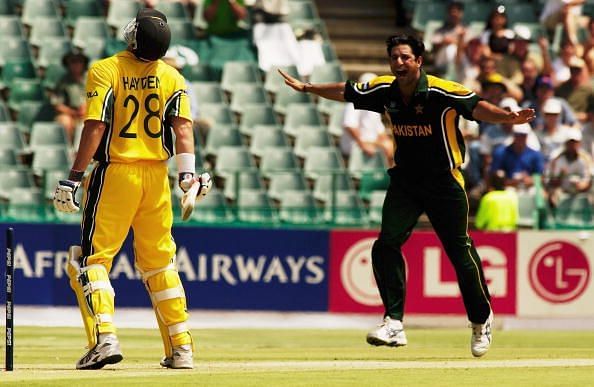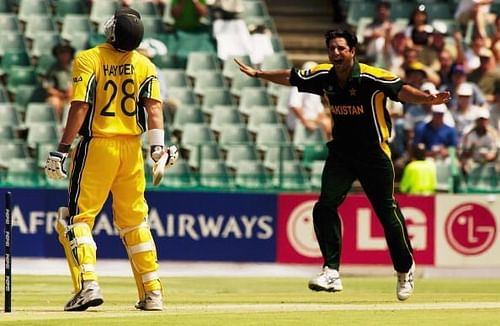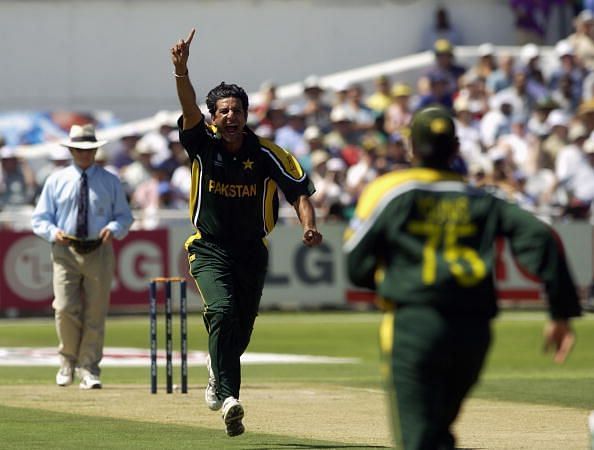
Sultan of Swing: Remembering the uber-talented Wasim Akram on his birthday

Fifty-two years ago, on this very day, one of the greatest left-arm fast bowlers in history was born. Playing cricket at top levels for almost 20 years, his famous whippy action brought him a record 916 international wickets for his country. In only his second Test, he took 10 for 128 at a batsmen-infested Dunedin pitch in 1985. Seven years later, he would quash all of England's hopes with two unforgettable deliveries, to Allan Lamb and Chris Lewis, in the World Cup final in Melbourne in 1992, each a definition of unplayable, as his nation lifted their maiden World Cup title. I'm talking about none other than Wasim Akram, fondly remembered as a "Sultan of Swing" - and rightly so.
Reverse swing and Pakistan had the strongest of bonds for a very long time in cricket. The bowlers that Pakistan produced had constantly baffled the opposition with their oddly-late-swinging deliveries ever since Sarfraz Nawaz destroyed an entire Australian batting lineup in a Test match in 1979. For the next decade, reverse swing was Pakistan Cricket's tightly-kept secret. Nawaz passed on the knowledge to the fiery Imran Khan, who taught it to his student, the guy in question. Cricket has never been the same since.
Akram redefined the art of swing bowling, showing that it’s as much about the bowler as it is about aerodynamics. In an era when captains scrambled to use up the quicks in their team before the ball got old, the genius of Akram made the final overs of a match the most lethal ones for batsmen, as his most potent weapon of reverse-swing worked like a charm once the ball lost its shine. Mark Waugh once remarked, “Akram can bowl anything and everything…he could land four balls on the same spot in an over and do four different things with it.” This was after the spell of some brilliant deliveries Akram had hurled at the former’s sibling in course of a Test match. “The quickest, meanest spell I’ve ever faced,” Steve Waugh reminisced about it, much later.
Just as the whole length of his career, Wasim's stint in cricket began on a fairytale note as well. He was one of those rare talents, who never played first-class cricket, before making his international debut. In fact, he could not even get into the college team. Born in a Punjabi Arain family in Lahore, Wasim Akram's magical moment came when he participated in the trials conducted at the Gaddafi Stadium. Interestingly, he was a mere spectator for the first two days and finally, got a chance to roll his arms over on the third day.
Straightaway, he impressed Pakistan's senior cricket Javed Miandad, who then pressed for Akram's inclusion immediately into the national team. That was the opening the legend needed. From a guy who was not even part of competitive cricket, Akram went on to become everything that he became. In fact, shockingly, Akram himself admitted that he did not know how to swing the ball during his early days.
On November 23, 1984, Akram made his international debut in the second ODI against New Zealand at Faisalabad. Soon after, he made his Test debut against the same opposition at Auckland and in just his second Test appearance for Pakistan, he bagged a fifer each in both innings and grabbed eyeballs. He was a regular member of the side in the late 1980s, until an injury forced him to stay away. Post multiple surgeries, Akram returned to the international circuit and the emphasis was on mastering the art of swing bowling. He also played a crucial role in Pakistan's success at the 1992 World Cup.

Akram broke through at a time when fast bowling was synonymous with names such as Alan Donald, Courtney Walsh, Curtly Ambrose, Glenn McGrath and compatriot Waqar Younis. However, he dominated all of them pretty soon. In the eight years between 1990 and 1997, Akram was the single greatest Test bowler around, and just not on paper. In the 48 matches he played in the above time period, he gathered an astounding 240 wickets at an outstanding average of 20. This included 16 five-wicket hauls – four of them featuring hat-tricks – and 3 ten-wicket kills. He collected 12 Man of the Match awards in the period – at an incredible rate of one every four matches. 53% of his wickets were estimated to be bowled or lbw; and that’s the kind of consistency and skill you cannot teach.
For good measure, Akram and Waqar Younis - partners in crime but never great friends - troubled almost all great teams of their era, the duo was literally unplayable. Hunting in tandem, the "Two Ws" as they were called, became the worst nightmares of even the most established batsmen of those times.
The fact that he would go right in through the defence of many batsmen at will spoke volumes of his ability, with the way he generated movement both off the pitch and in the air. During the 2003 World Cup, Akram became the first man on the planet to record 500 wickets in the 50-over format. Eventually, he finished his career as Pakistan's top wicket-taker in both Tests and ODIs. He was also the leading wicket-taker in ODIs, with 502 wickets, until Muttiah Muralitharan overtook him to push him to the second spot. Akram is still the leading wicket-taker in List A events, with 811 victims under his belt.
Akram was also an attacking batsman lower down the order. He was more a user-of-situation, than being well-versed in technique. His most memorable batting performances included a match saving-cum-winning knock of 45 at Lords, which took Pakistan from 95/8 to victory, chasing England's 138. And then there was the unbelievable 257 against Zimbabwe in ’96, still the biggest knock by a No. 8 batsman or lower. That innings, along with the couple of hundreds he notched up in pressure-cooker situations while touring Australia the previous year, underlined Akram’s all-rounder capabilities. Chuck in the film-star good looks and he really did have it all.
As a 35-year-old, Akram announced his retirement from ODIs, after the 2003 World Cup. Akram had earlier quit Test cricket in 2002. He was a key figure in England's domestic circuit, having represented Lancashire and later Hampshire as well, in county cricket.
Post-retirement, much like many former cricketers, Akram decided to voice his opinion on the game and became a prominent commentator. He also coached Indian Premier League (IPL) side Kolkata Knight Riders since 2010 and helped them to be crowned champions in 2012 and 2014. Today, he remains one of the most visible faces of Pakistan cricket. The wizard has left behind his book of spells, but he continues to teach and inspire. He has revolutionized the very idea of fast-bowling to become more than a weapon of intimidation, and yet he strives to continue his endeavour for the betterment of the craft. The numerous training camps he holds all over the globe, and also the coaching assignments of varying degrees, are a testimony to his passion and near-inexhaustible reserves of energy.
As we wish one of the world's one-of-the-best on his 52nd birthday, here's to hoping that his legacy grows on.